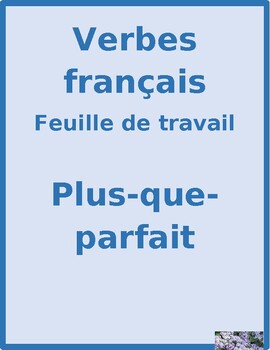

for reflexive verbs Example: Je m’étais trompé(e) dans mon calcul.Most verbs construct the plus-que-parfait using avoir, however être is used as the auxiliary verb in the following cases: Example: Je ne m’étais pas trompé dans mon calcul. I had left.→ I had not left.įor reflexive verbs, the reflexive pronoun comes after the first part of the negation (ne) and before the auxiliary verb (avoir/être). 👉 If I had gone to Spain, I would have been able to learn Spanish.In negative sentences, the past participle comes after the second part of the negation (pas). 👉 Si j’étais allé(e) en Espagne, j’aurais pu apprendre l’espagnol. 👉 If you had learned to ski, you would not have broken your leg. 👉 Si vous aviez appris à skier, vous ne vous seriez pas cassé la jambe. 👉 If we had gotten married, we would have organized a very nice party. 👉 Si nous nous étions marié(e)s, nous aurions organisé une très belle fête. 👉 If you had not done the dishes, I would not have helped you make dinner. 👉 Si tu n’avais pas fait la vaisselle, je ne t’aurais pas aidé à faire le dîner. 👉 If they had gotten up earlier, they would not have arrived late. 👉 Si elles s’étaient levées plus tôt, elles ne seraient pas arrivées en retard. 👉 If you had not put on makeup, we would have recognized you. 👉 Si vous ne vous étiez pas maquillé(e)(s), on vous aurait reconnu(e). 👉 If I had found ten euros on the ground, I would have bought you a coffee. 👉 Si j’avais trouvé dix euros par terre, je t’aurais payé un café. 👉 If your cell phone had not started ringing, we would have not gotten in trouble. 👉 Si ton portable ne s’était pas mis à sonner, on ne se serait pas fait gronder. 👉 If we had worked (studied) together, we would have passed our test. 👉 Si nous avions travaillé ensemble, nous aurions réussi notre examen. 👉 If you had not eaten so fast, you would not have had a stomachache. 👉 Si tu n’avais pas mangé si vite, tu n’aurais pas eu mal au ventre.

Third conditional si clauses suggest what someone would have done if a certain situation had presented itself. The result clause must be in the past conditional. The si part of the clause must always be in the plus-que-parfait tense. Which tenses are used in the third conditional? In other words, the tense of the two clauses follow a pattern that cannot be modified. The tense of the result clause depends on the tense of the si clause. They refer to the present, past, and future.Ĭonditional sentences have two parts: the condition, or si clause, and the result clause which indicates what will happen if the condition of the si clause is met. Si clauses indicate possibilities which may or may not actually happen. Si clauses, also known as conditionals or conditional sentences, are used to express what could happen if some condition is met. JOIN LLL’S ONLINE GRAMMAR AND CONVERSATION GROUPS ON TUESDAYS French Third Conditional Si Clauses


 0 kommentar(er)
0 kommentar(er)
